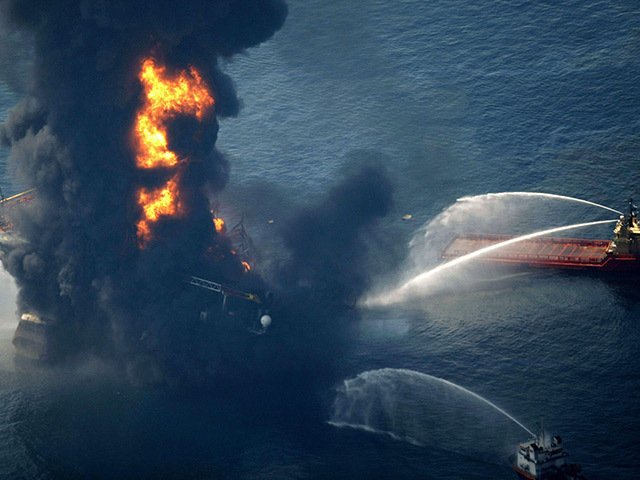
Kevin Lacy is still haunted by the Deepwater Horizon disaster — by the lives lost, the families devastated and the environment despoiled. He describes the images of the giant, burning rig as looking like “something from Pearl Harbor.”
Lacy spent three years as head of BP’s drilling operations in the Gulf of Mexico before resigning in late 2009 — just months before the accident, which killed 11 men and injured 17 others. He had grown concerned before he left that BP’s relentless focus on cost-cutting and production had overwhelmed concerns about safety in offshore operations. He never could have imagined, though, the scale and cost of the disaster that was unleashed on April 20, 2010.
The ruptured Macondo well spewed almost 5 million barrels of oil into the Gulf before it was finally capped 87 days later. BP, the operator on the program, has paid an estimated $40 billion in damages so far, and the tab is still running. The accident, the worst offshore oil disaster in US history, cost BP chief executive Tony Hayward his job and has forced the company to sell billions in assets around the world.
While Lacy believes that the unique characteristics of the Macondo well and BP’s own internal issues contributed to the disaster, he is increasingly concerned these days that the industry views the disaster as an anomaly, rather than a wake-up call.
“There’s a lot of reasons it happened to BP, but there’s also a lot of industry issues,” he said. “I’m not sure things have changed fundamentally to keep it from happening again. What else do you need? If Macondo doesn’t change attitudes, what will?”
Lacy has not spoken with reporters about his concerns prior to leaving BP, although parts of his testimony in the ongoing Macondo-related litigation in New Orleans have been made public. He recently agreed to sit down with me in Houston.
He told me he was concerned by the management shakeup in BP’s Gulf operations in the months before the accident. Too many people were too new in their jobs, he said. What’s more, BP’s well-documented fixation with cost containment always seemed to take precedent over other concerns such as safety.
He recounted a story in which the company insisted he change the brand of coffee provided for employees on his floor at BP’s west Houston offices. The change amounted to $60 or $70 in savings, and at first Lacy ignored the request. He said he was later criticized by a supervisor and told he wasn’t a team player for refusing to make the switch. He relented.
I hadn’t heard the coffee story before, but in working on my book, Drowning in Oil, which chronicled the events leading to the disaster, I heard many similar tales of cost-cutting and personal safety requirements conducted at a mundane, granular level that overshadowed larger issues of process safety. That continued within BP even after reports showed that process safety failures were a key factor in the company’s 2005 Texas City refinery explosion, which killed 15 people and injured more than 170.
“No one told me to cut corners, but there was extreme pressure to costs,” Lacy said. “[But] when you’re having conversations about coffee, someone’s lost perspective of what’s important.”
The industry, he said, owes it to the families of those killed on the Deepwater Horizon to do better. The business is getting riskier, and the industry needs shed its shared belief that another accident can’t happen.
Oil company executives should be held to a higher level of accountability for safety lapses, he said. Regulators often lack the expertise to effectively enforce rules, too many of which are too prescriptive, he said. He believes the industry needs to improve its use of real-time well data, to get more people – and more experience – studying information as it happens, rather than having the responsibility for key decisions fall solely on the judgment of people on the rig.
Lacy points out that high-reliability industries, such as airlines, don’t allow a single person to be in a position where their actions, by themselves, could lead to system failure. In other words, they have redundancies built into the decision making process. Airlines also have global standards to ensure safe operations are uniform from country to country. The energy industry has neither of these.
Lacy believes the industry needs to concentrate its safety efforts on the prevention, detection and response to potential accidents, rather than on emergency readiness and “fail safe” equipment such as blowout preventers. After all, the Macondo disaster taught us that BOPs are not as effective as a last line against disaster as the industry had long believed.
Lacy, who recently has been giving speeches on improving offshore safety, argues that the industry needs to develop a collaborative board that reviews well plans and encourages operators to embrace best practices. For too long, the industry has been reluctant to such information for proprietary reasons.
The costs, however, are simply too great. Another accident, even one far smaller than Macondo, will create such a public backlash it could shut the Gulf to offshore drilling – a decision that would be devastating for both the industry and the American public.
The best way the industry can ensure the lives lost on the Deepwater Horizon were not lost in vain is to use the disaster as a catalyst for meaningful change in its approach to safety.
“I come back to the families of Macondo four years later,” Lacy said. “Give them some closure.”
Recommended for you
